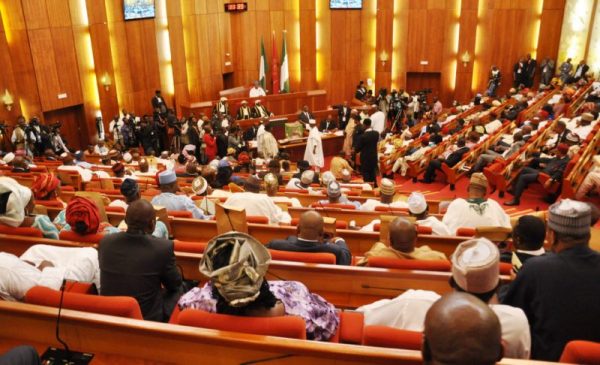Business
Senate passes bill to raise VAT to 7.5%

The Senate on Thursday passed the Finance Bill presented to it by President Muhammadu Buhari to raise the country’s Value Added Tax (VAT) from 5 to 7.5 percent.
The bill has five strategic objectives of promoting fiscal equity, reforming domestic tax laws and raising revenue. It is entitled, “A Bill for an Act to Make for incremental changes to Nigeria Tax and Fiscal Law and for Other Related Matters therewith, 2019 (SB 140).
The Amendments carried out were a total of fifty-six amendments of different existing Acts which include: Company Tax; Petroleum Profit Tax; Capital Gains Tax; Stamp Duty Tax; Personal Income tax and Customs and Excise Duty.
According to the Bill, a large sum of money realised from the taxation would go to the states and local governments while fifteen percent will go to the Federal Government.
VANGUARD reports that the Finance Bill was read the third time and passed after the consideration of the report of the Chairman, Senate Committee on Finance, Senator Solomon Olamilekan Adeola (APC, Lagos West).
The report read in part, “The bill has five strategic objectives, the first one is to promote fiscal equity by mitigating instances of regressive taxation. The second one is to reform domestic tax laws to align with global best practices. The third is to introduce tax incentives for investment in infrastructure.
“The fourth objective is to support ongoing ease of doing business reforms and the fifth objective is to raise revenues for government, including proposal to increase the value-added tax (VAT) from 5% to 7.5%.
“The 2020 appropriation bill is based on the provisions of this bill. The additional revenues will be used to fund health, education and infrastructure programmes.
“The states and local governments are allocated 85 per cent of all VAT revenues. This bill seeks among other things, to amend the following tax provisions and make them more responsive to the policies of the federal government.
“(A) The company tax CAP C21 Laws of the Federation of Nigeria 2004.
“(B) To reform VAT CAP 4 2007 – this is in line with global best practices. It seeks to improve the efficiency of the Nigerian VAT system.
“(C) Customs and excise tariff act CAP C49 Laws of the Federation of Nigeria 2004 – this bill seeks to subject certain goods to excise duties in similar manner of their locally manufactured counterparts.
“(D) Reforming personal income tax E8 laws of the federation of Nigeria – the bill seeks to provide clarity in individual taxes of Nigeria
“(E) Capital gains tax act CAP C1 laws of the federation of Nigeria 2007 – this bill seeks and cover taxation of business combinations and seeks to prevent abuse of provisions of the act on group restructuring.
“(F) Stock duty act 58 laws of the federation of Nigeria – this bill seeks to increase the duty on electronic stocks and electronic consumption.
“(G) Petroleum profit tax – this bill seeks to increase revenue by removing the tax exemption granted for dividends or income derived from companies charges under the act. VAT is a good avenue for generating high revenue for the government. This bill will transform our economic fortunes.”
